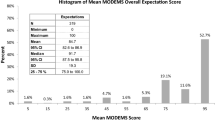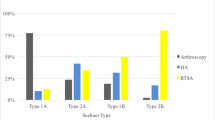Abstract
Patient expectation of outcome after orthopaedic surgery has been little studied. Some studies have assessed the effect on shoulder surgery, even fewer after management of rotator cuff tears, but there is nothing specific for the effect of patient expectation on the outcome of the treatment of large to massive rotator cuff tears. However, all studies conclude that the better informed the patient, the better the expectation of outcome and the better the result of the treatment. The practitioner should develop a consistent and reliable method of informing patients of what is going to be involved in the management of the patients care and give a realistic expectation of outcome. This will be time spent wisely; the evidence is that it will improve not only the patient’s expectation but also the overall result.
Access this chapter
Tax calculation will be finalised at checkout
Purchases are for personal use only
Similar content being viewed by others
References
Zywiel MG, Mahomed A, Gandhi R, Perruccio AV, Mahomed NN. Measuring expectations in orthopaedic surgery: a systematic review. Clin Orthop Relat Res. 2013;471:3446–56.
Swarup I, Henn CM, Gulotta LV, Henn RF III. Patient expectations and satisfaction in orthopaedic surgery: a review of the literature. J Clin Orthopaed Trauma. 2019;10(4):755–60.
Mancuso CA, Altchek DW, Craig EV, Jones EC, Robbins L, Warren RF, Williams-Russo P. Patients’ expectations of shoulder surgery. J Shoulder Elb Surg. 2002;6:541–9.
Henn IIIRF, Ghomrawi H, Rutledge JR, Mazumdar M, Mancuso CA, Marx RG. Preoperative patient expectations of total shoulder arthroplasty. J Bone Joint Surg Am. 2011;93:2110–5.
Tashjian RZ, Bradley MP, Tocci S, Rey J, Henn RF, Green A. Factors influencing patient satisfaction after rotator cuff repair. J Shoulder Elb Surg. 2007;16:752–8.
American Academy of Orthopaedic Surgeons. Musculoskeletal outcomes data evaluation and management system. Rosemont, IL: American Academy of Orthopaedic Surgeons; 1997.
Henn IIIRF, Kang L, Tashjian RZ, Green A. Patients’ preoperative expectations predict the outcome of rotator cuff repair. J Bone Joint Surg Am. 2007;89(9):1913–9.
Oh JH, Yoon JP, Kim JY, Kim SH. Effect of expectations and concerns in rotator cuff disorders and correlations with preoperative patient characteristics. J Shoulder Elb Surg. 2012;21:715–21.
Chester R, Jerosch-Herold C, Lewis J, Shepstone L. Psychological factors are associated with the outcome of physiotherapy for people with shoulder pain: a multicentre longitudinal cohort study. Br J Sports Med. 2018;52(4):269–75.
Chung SW, Park JS, Kim SH, Shin SH, Oh JH. Quality of life after arthroscopic rotator cuff repair evaluation using SF-36 and an analysis of affecting clinical factors. Am J Sports Med. 2012;40(3):631–9.
Ainsworth R. Physiotherapy rehabilitation in patients with massive, irreparable rotator cuff tears. Musculoskeletal Care. 2006;4(3):140–51.
Ainsworth R, Lewis J. Exercise therapy for conservative management of full thickness tears of the rotator cuff: a systematic review. Br J Sports Med. 2007;41:200–10.
Jeanfavre M, Husted S, Leff G. Exercise therapy in the non-operative treatment of full-thickness rotator cuff tears: a systematic review. Int J Sports Phys Ther. 2018;13:335–78.
Edwards P, Ebert J, Joss B, Bhabra G, Ackland T, Wang A. Exercise rehabilitation in the non-operative management of rotator cuff tears: a review in the literature. Int J Sports Phys Therapy. 2016;11(2):279–301.
Burkhart SS. Fluroscopic comparison of kinematic patterns in massive rotator cuff tears. A suspension bridge model. Clin Orthop Relat Res. 1992;(284):144–52.
Levy O, Mullett H, Roberts S, Copeland S. The role of anterior deltoid re-education in patients with massive irreparable cuff tears. J Shoulder Elb Surg. 2008;17:863–70.
Thes A, Hardy P, Bak K. Decision making in massive rotator cuff tear. Knee Surg Tramatol Arthrosc. 2015;23:449–59.
Mahomed NN, Liang MH, Cook EF, Daltroy LH, Fortin PR, Fossel AH. The importance of patient expectations in predicting functional outcomes after total joint arthroplasty. J Rheumatol. 2002;29:1273–9.
Mondloch M, Cole D, Frank J. Does how you do depend on how you think you’ll do? A systematic review of the evidence or a relation between patients recovery expectations and health outcomes. Can Med Assoc J. 2001;165(2):174–8.
Barron C, Klaber MJ. Patient expectations of physiotherapy: definitions, concepts and theories. Physiother Theory Pract. 2007;23(1):37–46.
Chester R, Jerosch-Herold C, Lewis J, Shepstone L. Psychological factors are associated with the outcome of physiotherapy for people with shoulder pain: a multicentre longitudinal study. Br J Sports Med. 2018;52(4):269–75.
Warth RJ, Briggs KK, Dornan GJ, Horan MP, Millett PJ. Patient expectations before arthroscopic shoulder surgery: correlation with patients’ reasons for seeking treatment. J Shoulder Elb Surg. 2013;22:1676–81.
Mancuso C, Altchek D, Craig E, Jones E, Robbins L, Warren R, Williams-Russo P. Patient expectations of shoulder surgery. J Shoulder Elb Surg. 2002;11:541–9.
Pogorzelski J, et al. Postoperative outcomes—are we asking the right questions? Shoulder arthroscopy patient quality of life correlates with joint-specific outcome and is predicted on patient expectation. Arthroscopy. 2017;33(10):1786–7.
Jain N, Ayers G, Fan R, Kuhn J, Baumgarten K, Matzkin E, Higgins L. Predictors of pain and functional outcomes after the nonoperative treatment of rotator cuff tears. J Shoulder Elb Surg. 2018;27(8):1393–400.
Boorman R, More K, Hollinshead R, Wiley J, Brett K, Mohtadi N, Nelson A, Lo I, Bryant D. The rotator cuff quality of life index predicts the outcome of non-operative treatment of patients with a chronic rotator cuff tear. J Bone Joint Surg. 2014;96:1883–8.
Chartered Society of Physiotherapy. Core standards of physiotherapy practice. London: Chartered Society of Physiotherapy; 2005.
Dalton D, Kelly E, Molony D. Availability of accessible and high-qaulity information on the internet for patients regarding the diagnosis and management of rotator cuff tears. J Shoulder Elb Surg. 2015;24:135–40.
Levy O. Deltoid re-education program for massive cuff tears. Oper Tech Orthopaed. 2018;28:1790190.
Seida JC, LeBlanc C, Schouten JR, Mousavi SS, Hartling L, Vandermeer B, Tjosvold L, Sheps DM. Systematic review: nonoperative and operative treatments for rotator cuff tears. Ann Intern Med. 2010;153:246–55.
Author information
Authors and Affiliations
Corresponding author
Editor information
Editors and Affiliations
Rights and permissions
Copyright information
© 2020 ESSKA
About this chapter
Cite this chapter
Hackney, R., Pollard, E., Cowling, P. (2020). Patient Expectation in the Treatment of Rotator Cuff Tears: What Is Its Role?. In: Sampaio Gomes, N., Kovačič, L., Martetschläger, F., Milano, G. (eds) Massive and Irreparable Rotator Cuff Tears. Springer, Berlin, Heidelberg. https://doi.org/10.1007/978-3-662-61162-3_18
Download citation
DOI: https://doi.org/10.1007/978-3-662-61162-3_18
Published:
Publisher Name: Springer, Berlin, Heidelberg
Print ISBN: 978-3-662-61161-6
Online ISBN: 978-3-662-61162-3
eBook Packages: MedicineMedicine (R0)




